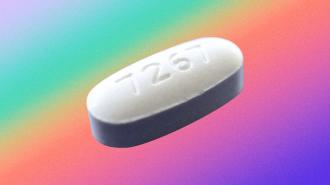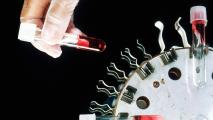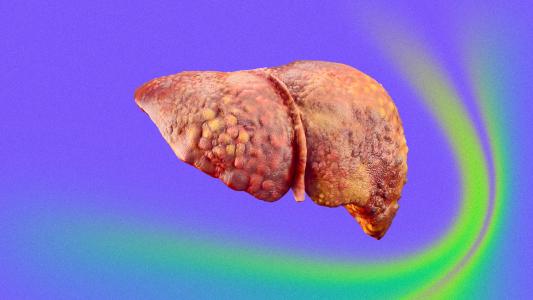The diabetes drug metformin cut COVID-19 patients’ risk of developing long COVID by 41% in a small study. If the results hold up, we could have a cheap, safe way to prevent the potentially debilitating condition.
The challenge: Most people who contract COVID-19 feel better within a week or two, but roughly 15% will find themselves living with lingering health issues — such as fatigue, brain fog, or breathing difficulties — for weeks, months, or even longer after their infection resolves.
This condition, long COVID, was noticed relatively early in the pandemic, yet there’s still a lot about it we don’t know, including whether it’s a single condition or if there’s a way to treat or prevent it.
“[Metformin’s] use as a preventive measure could have significant public health implications.”
Carolyn Bramante
What’s new? The team behind the phase 3 COVID-OUT trial is now reporting that treating people with metformin, a cheap, commonly prescribed diabetes drug, soon after they tested positive for the coronavirus reduced their risk of developing long COVID by 41%.
“The results of this study are important because long COVID can have a significant impact on people’s lives,” said principal investigator Carolyn Bramante. “Metformin is an inexpensive, safe and widely available drug, and its use as a preventive measure could have significant public health implications.”
The trial: The primary outcome of the COVID-OUT trial was to test whether three drugs — metformin, ivermectin, and fluvoxamine — could prevent a COVID-19 infection from becoming severe.
It took place at six sites in the US and included more than 1,300 people between the ages of 30 and 85. All of the participants qualified as overweight or obese, and all had tested positive for COVID-19 within three days of enrolling in the trial.
In the groups that didn’t receive metformin, the long COVID rate was 10.4%. In the metformin groups, it was 6.3%.
Participants were divided into six groups. Three groups received a 14-day regimen of metformin and either a placebo, ivermectin, or fluvoxamine. The other groups received ivermectin plus a placebo, fluvoxamine plus a placebo, or only placebos.
No treatment, alone or combination, prevented their infections from becoming severe, but more than 1,100 participants agreed to follow up with researchers for months after the trial to see whether any of the interventions could prevent long COVID.
Among those who received metformin (alone or with another drug), 6.3% reported developing long COVID by day 300. In the groups that didn’t receive metformin, the rate was 10.4%, suggesting that metformin may reduce the risk of long COVID by 41%.
Larger trials comparing metformin alone to a placebo may be needed to confirm the results.
Looking ahead: This was a relatively small trial, with just 93 people overall developing long COVID (35 in the metformin group and 58 in the non-metformin group), and it’s not entirely clear whether the inclusion of other drugs along with metformin could have played a role in the outcomes. (Although no other drug appeared to have an effect on long COVID outcomes in the data.)
To find out for sure whether the diabetes drug can prevent long COVID, and whether it works for people who are not overweight or obese, larger trials comparing metformin alone to a placebo may be needed. Including people who are younger and who have already had COVID-19 before will lead to even more robust and generalizable results.
If metformin is able to prevent long COVID, we can then start figuring out how it does so — and that could potentially lead to treatments for the millions of people already living with the condition.
We’d love to hear from you! If you have a comment about this article or if you have a tip for a future Freethink story, please email us at tips@freethink.com.






